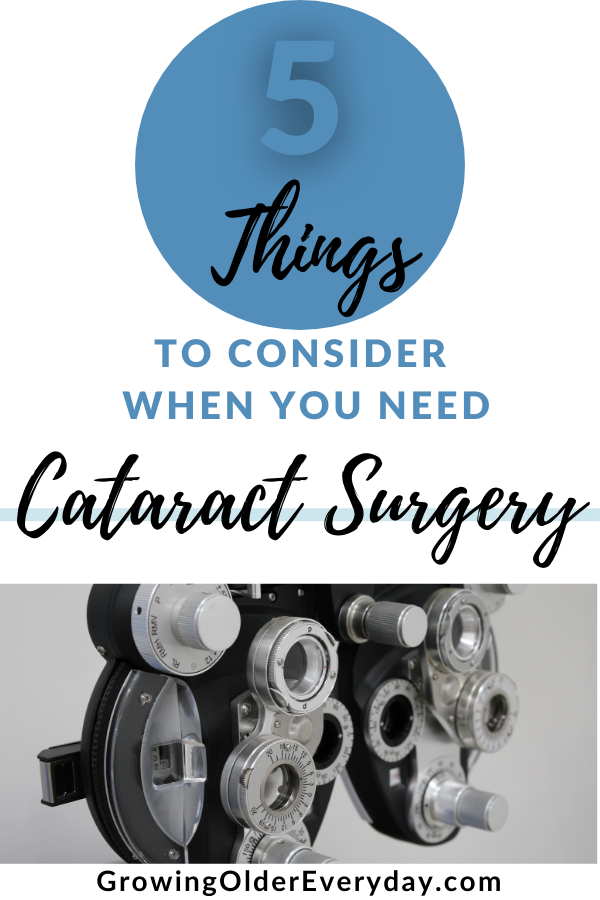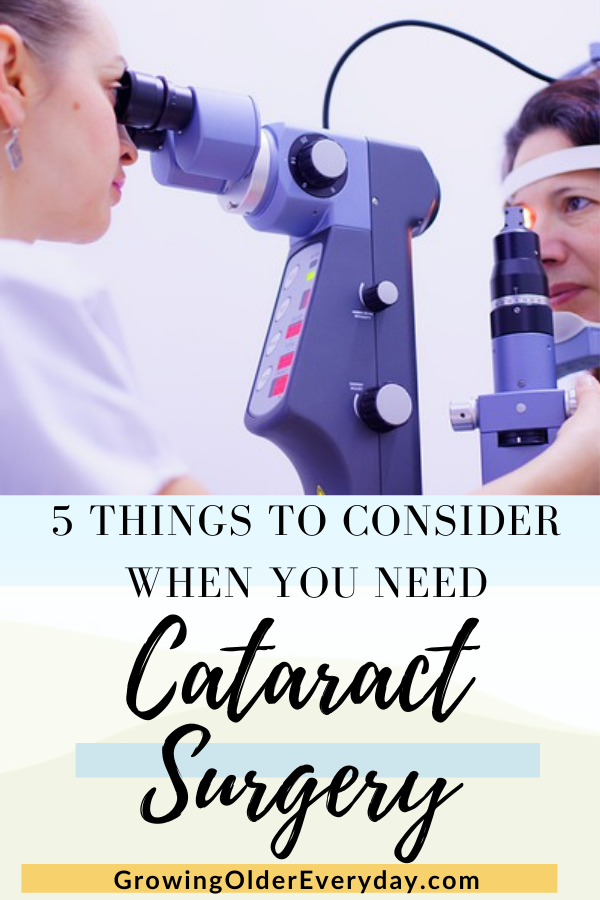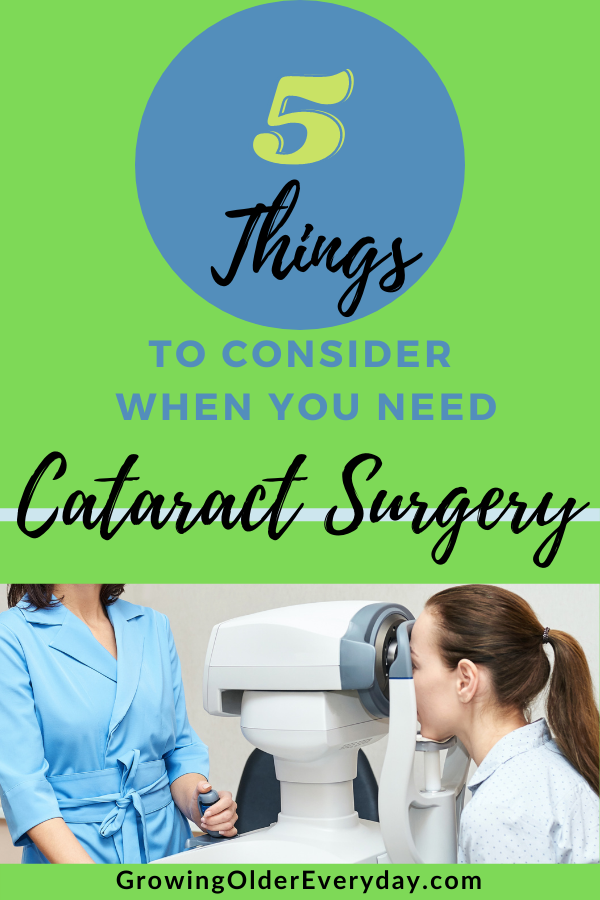
I encourage everyone to get an annual eye exam once they become 50. If you have never had glasses or contact lenses before that doesn’t mean you don’t need to have your eyes examined. I wore glasses most of my life. At my exams my optometrist starting mentioning I had cataracts, but I had time. Eventually, I was caught off guard when I was told I needed cataract surgery. Without the surgery, I would soon no longer able be to legally drive.
When your eyesight has deteriorated to the point you need to have cataract surgery there will be choices to be made. Most people will have their surgeries one or two weeks apart. This allows time for your first eye to heal before your second surgery. However, some people have only one eye affected.
Three million Americans a year have cataract surgery, so it is not unusual to need this surgery. Cataract surgeries are something that happens as we grow older. Of those 80 or older, the likelihood of having had cataract surgery is 90%.
Symptoms of cataracts
Cataracts cause a clouding of the lens on one or both of your eyes. This typically begins in your 50s or 60’s. It gradually gets worse over a period of 10 to 20 years. Protein builds up and clumps together. This makes it harder to see. Things can become hazy or possibly less colorful. When my cataracts started my optometrist mentioned it but said I had time. I didn’t really notice things getting worse, since I went in regularly and had my prescription for my eyeglasses adjusted each time. When my doctor told me it was time, I was caught off guard because I believed old people had cataracts. I was 59 when I was told it was time to have something done.
Symptoms include sensitivity to light and glare. Cloudy, blurry vision can make it difficult to drive at night. It can become harder to read small print. A person may also have double vision.
When I found out I needed cataract surgery I was wearing trifocals. So I was used to wearing prescription lenses almost all of the time.
What is a cataract?
A cataract isn’t something in your eye that they remove like they would a growth. The lens in your eye, the one you were born with, will become so cloudy that light rays don’t go through your lens and land on your retina properly. The light rays will scatter instead of landing in one spot.
Your optometrist refers you to an opthalmologist. The ophthalmologist will run tests on your eye(s) and recommend cataract surgery if he/she feels it is necessary. Your damaged lens will be removed by an ophthalmologist. The ophthalmologist will replace your damaged lens with a clear artificial lens. This lens is called an intraocular lens (IOL.) Your ophthalmologist will measure your eye prior to your surgery to make sure the IOL will focus properly.
Five things to consider when you need cataract surgery
Once you have learned surgery is your best option, there is usually plenty of time, so take some of that time to consider your choices and make your decisions. There are several things you should consider.
- Should I have my eyes made far-sighted or near-sighted? Or 20/20?
- Should I have surgery on both eyes at the same time, or a week or two apart?
- Can I wait for a while before I make the decision?
- Am I too old to consider having this surgery?
- What are the risks of cataract surgery?
Far-sighted or near-sighted? Or 20/20?
I was given the choice to end up with my vision being far-sighted or near-sighted. There was also the choice of having 20/20 vision, with no lenses required after surgery. That was my preferred choice. However, it was not covered by my insurance. At the time, money was a big factor and I could not afford to pay for the surgery myself. Cataract surgery can range from $3,783 to $6,898 per eye. These are 2019 estimates. Your cost will depend on the insurance coverage you have and your deductible.
Medicare, if you have the correct plan, should cover cataract surgery if your doctor says it is necessary. If you do not have the proper coverage with Medicare, you can possibly wait and change your coverage during open enrollment.
This choice should be given a lot of consideration. I chose to be far-sighted, so I keep inexpensive readers in every room of the house and in my purse. I didn’t want to have to wear glasses when I was driving, because then I would also require prescription sunglasses. Wearing glasses to read wasn’t a big deal until I started living that way.
Being far-sighted means I have to put on glasses when I work on my computer, look at a menu in a restaurant, look at my cell phone, open my mail, water my indoor plants, work on a puzzle, look at a recipe I am preparing, try to find how my windshield wipers work in my car I purchased recently, pay my bills, etc. I spend a lot of time putting my glasses on and off.
The time period between cataract surgeries
Typically you do not have both eyes done at the same time. That’s not saying you can’t, but you need to factor in how your daily routine is affected by surgery. My mother and I each had our surgeries two weeks apart. If I had wanted it, I’m pretty sure I could have had them a week apart. And of course, this will also depend on your ophthalmologist’s schedule.
Operate now or wait?
Check with your optometrist to see how long you can wait before you have surgery. If your eyesight isn’t affecting you in a negative way, you may be able to go months or years until you have your surgery. It will also depend on your lifestyle and ability to get around. Waiting too long can result in blindness, so take your doctor’s recommendations seriously.
Am I too old for cataract surgery?
My mother was 83 when she had her surgery. It seemed like a good decision because she was having a hard time reading. However, it ended up that she died the next month. That was very unexpected and I truly thought she would have enjoyed many years of reading with her new lenses. So it is possible, if the patient has a serious illness they are not expected to survive, they might not want to go through with having the surgery. Keep in mind that some people do live to be 100 and cataract surgery may make those last 10, 20, or more years much more pleasant.
There are some conditions that may make it less likely you can have the surgery. These can be dementia or heart and lung conditions.
What are the risks of cataract surgery?
With every surgery there are risks. I’ve had surgeries that included the risk of death. Doctors must disclose every risk they are aware of, just in case. Keep in mind that 98% of cataract surgeries are successful. I was not personally influenced by the risks, but they could be concerns for you. If you have any concerns, talk to your ophthalmologist before your surgery. Here are some of the risks:
- Infection
- Bleeding
- Swelling of the retina
- Detached retina
- IOL may move and have to be repositioned
- Pain that does not go away with over-the-counter medicine
- Swelling of the front of the eye or inside of the eye
- Vision loss
Cataract surgery
Prior to your surgery, you may receive a prescription eye drop to take a day or two before your surgery. These drops are to help prevent infection and to reduce swelling during and after your surgery. You will not be allowed to eat at least six hours before surgery. No make-up or contact lenses can be worn on the day of your surgery. No lotion or cream on your face. You are asked to wear loose, comfortable clothing.
Also, you may have been advised to stop a prescription medicine(s) that you take, depending on what you take. The surgery is a same-day procedure, most likely done in an outpatient facility or possibly in a hospital. You will require a driver to bring you home. You should have someone stay with you for 24 hours. I was taken home, but my husband did not stay with me for 24 hours. We didn’t feel it was necessary. I didn’t have any bad reaction and I slept for some time after I came home.
Drops will be put in your eye to numb the eye. Alternately, you may be given a shot around your eye. If needed you will be given medication to relax. During the surgery, you will be awake, but not really aware of what is happening. You might see some movement and light.
Your surgeon will make some cuts near your cornea. The cornea is the clear covering of your eye. The surgeon may use a laser or a blade. Instruments are used to break up your lens and remove the pieces. Then your new lens will be set in place. Your surgeon will most likely NOT stitch the incisions closed. The incisions will heal on their own. The surgery usually takes less than one-half hour.
Recovery from cataract surgery
After surgery, you will be wheeled into the recovery area. Your stay there will about 30 minutes.
You will leave the facility with a patch over your eye and a pair of disposable sunglasses, to protect your eyes. The patch over your eye is covering a plastic shield that is taped over the eye to protect it. The shield is supposed to be worn to bed every night for a week or more, as instructed by your surgeon. You will have a follow-up appointment with your regular eye doctor the next day or as soon as possible thereafter.
Recovery from cataract surgery is minor. Your surgeon will give you follow-up instructions before you leave. Follow those instructions carefully. Be sure that you do not get any soap or water in your eye. Use your prescribed eye drops as instructed. You should not touch your eye or rub it. Remember you have no stitches, so you do not want to cause damage to what the surgeon has done. Over-the-counter pain medicine can be taken as instructed by your surgeon or nurse, as needed.
The surgeon will also advise you of any limitations on your activities including driving and exercise. It might be possible for you to drive the next day. Likely you will have signed a form, before surgery, saying you have been advised of the possible risks, which includes a list of things like infection.
I brought my mom to have her surgery in 2020, at age 83. She wanted to itch her eye and felt like something was in there that she wanted to remove. That sounded familiar to my experience, but we knew that was not allowed. It was nice being on the other side of the procedure.
Options instead of cataract surgery
According to the internet, there are eye drops that can be used instead of surgery. Or food choices that can help. According to doctors, these are options that do not cure cataracts. Maybe someday, but not at this time. If you have been convinced that there are options out there, other than surgery, I recommend checking with your optometrist or ophthalmologist first.
Years after cataract surgery
I thought that once I had the surgery, I would be fixed for life. Not necessarily. It could be months, maybe years later that you begin to be bothered by blurriness. I have a pair of prescription lenses, but I mostly wear readers. After four years I noticed that I had an issue. I cleaned my glasses but it didn’t help. It was only in my left eye. My issue was cloudiness on the posterior capsule, the capsule that holds my lens in place. This required a YAG capsulotomy.
YAG capsulotomy
The procedure lasted about a half-hour or less. I had to rest my chin on a stand in front of the YAG laser. A laser was focused on a small area. My ophthalmologist controlled the laser. It is very precise and safe. I could hear a clicking sound. It’s possible to see flashes of light, but I don’t remember any. I had to hold my head still. My doctor removed a small section of the posterior capsule. She did it in a horseshoe section. It took several bursts from the laser to cut it away. There was a period of 5-10 minutes while she waited for the pieces to fall down, out of my line of vision. The small opening she made allows enough light to go through and to keep my IOL in place.
This was pain-free and my ophthalmologist did it in a special room in her office. The change should be noticed quickly and mine was. I had brought a driver to bring me home, but I don’t think I needed one. There were no incisions made and no risk of infections. There were a few minor risks that my doctor explained before the procedure. She had dilated my eye before the procedure so I did have to wear sunglasses home. I had a follow-up appointment to test my eye pressure. My understanding is a YAG capsulotomy should not be needed again in my lifetime. However, it could still happen to my right eye.
Your most difficult decision
Each day as I put my reading glasses on I wish that I had chosen to be near-sighted. I spend a lot of time focusing on what I can’t do. I can’t read anything on my phone, computer, or in a book without putting glasses on. Reading glasses are required to make my grocery list, to go through my mail, and pay my bills. I feel I am wearing glasses more often than not. However, I don’t need glasses to walk around my house, watch T.V., drive or walk around my neighborhood. So there are positives and negatives no matter what choice you make. It’s a hard decision, so if you need cataract surgery, take some time to think about it.
Please share this post with anyone you know that is having blurriness in one or more of their eyes. Or someone that is facing the decisions about cataract surgery. Have you had or been told you need cataract surgery? Do you have questions? Please let me know in the section below.


I always thought cataract was connected with very old age, but I see now it can become a problem quite early in life. This is extremely informative; thanks for putting the information together!:)
Mihaela,
I really thought I would be in my seventies or eighties before I had cataract surgery. It was odd for me that my mother had her surgery when she was over 20 years older than when I had mine. That is why getting your eyes checked is so important, especially if you notice any change. I’m happy you found the information valuable. Thank you for commenting.
Such an informative post. My mother had cataract surgery in one eye and shortly she will do the other one too. So this post comes in at the right time for me. Thanks!
I’m so happy that this post was helpful to you. Cataracts are so common but it’s important to take all things into consideration. I hope all goes well with your mom’s surgery. Thank you for your comment.